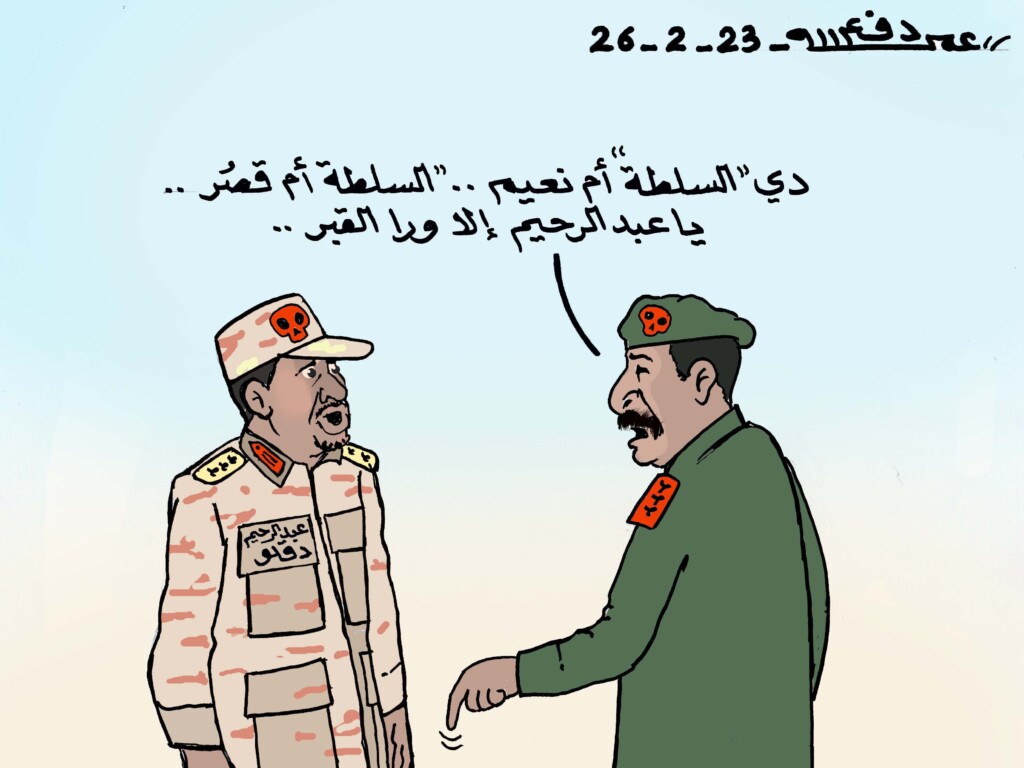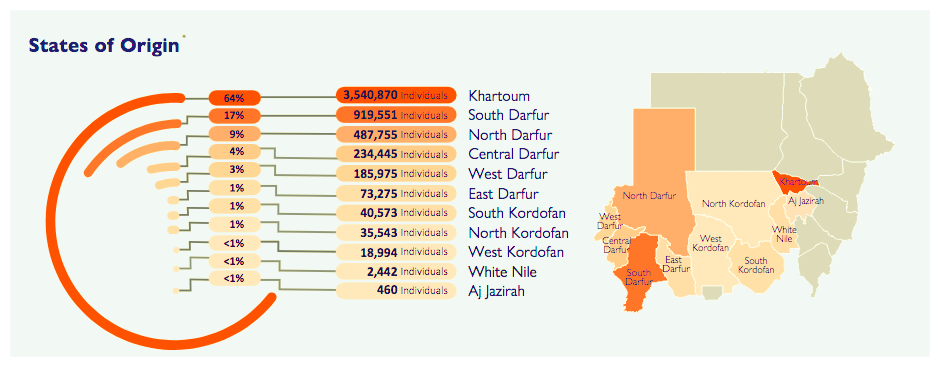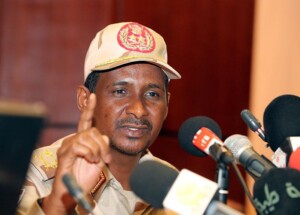Sudan lawyer condemns ethnically-based mobilisation of civilians in River Nile

El Burhan tells RSF Deputy Commander Abdelrahim Dagalo: You’ll enjoy the pleasers of power only in your grave. (Words based on a verse by the famous Sudanese poet Hemeid) (Cartoon by Omar Dafallah / RD)
River Nile state is witnessing a large-scale mobilisation campaign to counter a possible attack by the Rapid Support Forces (RSF) on the region. The mobilisation is reportedly based on ethnic background. The governor of the River Nile state, Mohamed El Badawi, announced his “readiness to arm all those capable of carrying weapons” on Saturday.
Hatem Elyas, lawyer and human rights activist, told Radio Dabanga that large-scale campaigns to recruit mobilisers and mobilise civilians are taking place in the state after the RSF made significant territorial gains over the Sudan Armed Forces (SAF) within a few days in El Gezira in central Sudan last week. RSF soldiers have already been seen near Shendi town.
The mobilisation based on ethnic background is being supervised by influential former members of the dissolved National Congress Party (NCP) who fled to the state after the war broke out between the Sudan army and RSF in mid-April, Elyas said.
The human rights activist said that “since long, River Nile state hosts many people from the Darfur region. Recently, more Darfuri arrived in the state. Therefore, influential remnants of the former Al Bashir regime, many of whom also fled to River Nile state, are concerned that the state has the potential to have many RSF sleeper cells.”

According to the Displacement Tracking Matrix of the International Organisation for Migration, 619,659 people have fled to River Nile state since April 15, when war broke out between the SAF and RSF. Most displaced persons nationwide are from Khartoum state (64 per cent), followed by South Darfur (17 per cent), North Darfur (9 per cent), Central Darfur (4 per cent), and West Darfur (3 per cent).
Call to arms
The governor of the River Nile state, Mohamed El Badawi, announced his “readiness to arm all those capable of carrying weapons” on Saturday. He also announced directives to increase security in all residential areas in the state.
During his speech to crowds gathered in the state capital, Ed Damer, he pledged to support the SAF and protect the state against all threats, stressing that general mobilisation must be with all the people of Sudan.
People themselves are also preparing for possible attacks by the RSF. “I picked up a gun to defend myself, my ethnic group, and my homeland,” said Yasir, from Shendi. “The RSF are not just at war with the army. They are at war with civilians,” he told Al Jazeera..
At least 150,000 people have reportedly volunteered to conscript to the SAF since mobilisation calls on reservists and civilians, including members of the Beja and Rashaida tribes in eastern Sudan.
The authorities in River Nile state have also launched a detention campaign for Sudanese originating from western Sudan, under the pretext of belonging to the RSF, which has sparked widespread criticism.
Unjustified targeting
Grassroots and civil society groups in River Nile state oppose calls by the governor and Islamist authorities to join the SAF, said Elyas. “Sadly, the democratic movement and those suspected of having differing views are now being pursued and oppressed. They are accused of being complicit with the RSF and put under surveillance that exceeds even the Al Bashir era.”
A statement by activists in Shendi and El Matamma yesterday said that they “refuse to arm civilians, especially minors, whether in the River Nile state or anywhere. We will not throw them into this cursed war.”
“We feel anger, sorrow, and sadness at the ethnic and tribal targeting behaviour of Sudanese people who have been living peacefully and humanely for years in River Nile state. They are easy to recruit because they have been cut off from their livelihoods.
The statement called on “the parties committing this hateful act, which does not resemble the people of the region, who are known for honouring their guests and helping even the godless, to stop this behaviour creating an atmosphere of hatred and reviving old strife.”
The activists urged the authorities to stop arbitrary detentions against civilians, calling on the concerned authorities in River Nile state to release all innocent people from detention immediately. The statement called their actions “unjustified targeting. Every suspect should be brought to a fair court and be treated as innocent until proven guilty.”
‘Big catastrophe’
Elyas described the ethnically based discrimination in towns like Shendi, Atbara, Ed Damer, Berber, Abu Hamed, El Bawga, and the areas of Rubatab as much more dangerous than what happened during the Al Bashir regime.
“What is happening in the River Nile state is unprecedented, as there has always been peaceful coexistence between those coming from all over Sudan and the people of the state.
“Unfortunately, with the outbreak of war and the failure of NCP supporters to find any legitimacy for their existence,” especially after Islamic legislation was abolished in July 2020, they resorted to the “bad card” of describing the current war as a war between Sudan’s West and North, or an attack by western elements on the population in northern Sudan.
The lawyer stressed that River Nile state “should be aware that these ethnic and racist calls could lead to a big catastrophe” for the state’s people, history, social values, and human rights.
Elyas warned that the situation could turn into a catastrophic stage if not remedied, and that this is not only related to routine violations but may turn into a catastrophic matter through extrajudicial assassinations, reprisals, and systematic killings.
He appealed to the people of River Nile state not to respond to these voices that seek sedition and seek to drag the state into a tragic situation and devalue their neighbours, who are known for their wisdom and adherence to the values of coexistence among all members of the Sudanese people.
Activists in Shendi and El Matamma urged the parties to the conflict to arbitrate the voice of reason and wisdom for an immediate ceasefire and to return to the negotiating table with a compassionate heart and an open mind that spares the country and the people the horrors, atrocities, and tragedies of war.
RSF advance
The RSF took control of El Gezira on December 18, then entered El Giteina town in neighbouring White Nile state on Thursday. Other paramilitary units are allegedly advancing to Sennar, south of El Gezira.
Currently, the RSF control most of Khartoum and most of western Sudan, while the SAF control most of the north and east. After the army lost control over most of the capital, Khartoum, they relocated most government institutions to a new de facto capital, Port Sudan.
Earlier this week, security authorities in White Nile state launched large-scale detention campaigns for hundreds of people on ethnic grounds, which provoked widespread anger.
In Wad Madani, capital of El Gezira, security forces last week detained dozens of young men on ethnic basis among the residents and displaced in the city following instructions by the governor of El Gezira, who ordered “the detention of all members of the fifth column cooperating with the RSF militiamen, and which consists of displaced originally from Darfur and Kordofan, who entered El Gezira recently, members of the forces of the Freedom and Change Declaration, and of the resistance committees”.
As reported by Radio Dabanga at the beginning of April, Retd Navy Lt Col Omar Arbab accused the Sudanese army of involvement in the formation of new militias, such as the Homeland Shield Forces and the Sudan Entity Forces.
In Sudan’s intricate political and military arena, new and established actors continually surface, raising concerns over a prolonged conflict. A new group, the Sudanese Popular Resistance Factions (PRF), announced its aim to “liberate Khartoum” from the RSF in September. Another prominent player, the Islamists El Baraa Ibn Malik Brigade, gained attention through its active role in battles.











 and then
and then